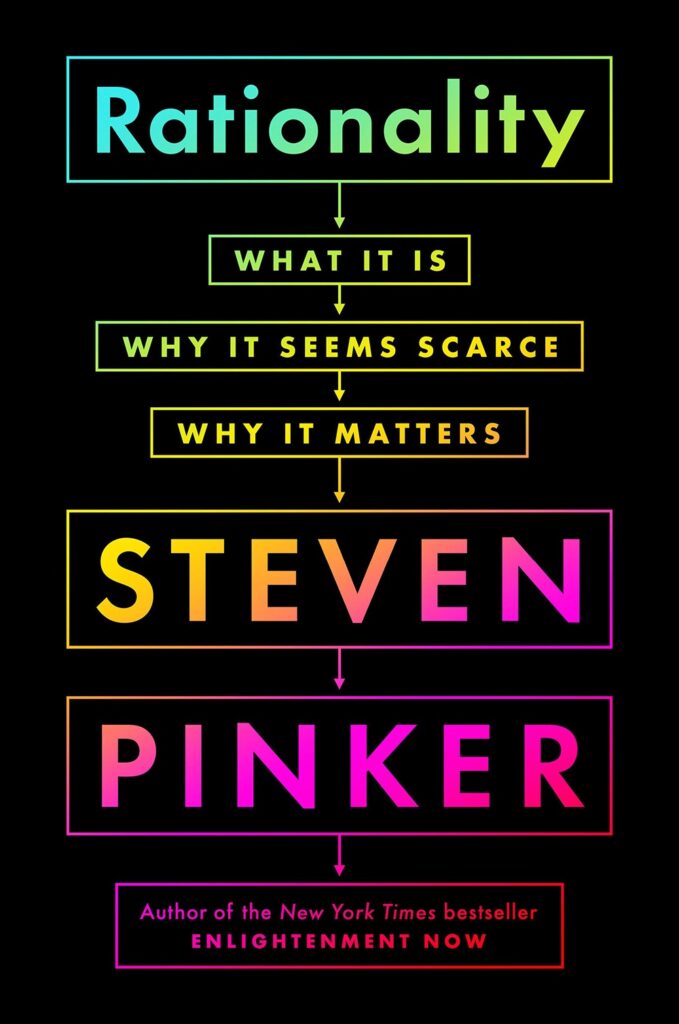Sharing my learnings from the book, Rationality by Steven Pinker.
Rationality by Steven Pinker
Can reading a book make you more rational? Can it help you understand why there is so much irrationality in the world? These are the goals of Rationality, Steven Pinker’s follow-up to Enlightenment Now. In the 21st century, humanity is reaching new heights of scientific understanding—and at the same time appears to be losing its mind. How can a species that developed vaccines for Covid-19 in less than a year produce so much fake news, medical quackery, and conspiracy theorizing? Pinker rejects the cynical cliché that humans are an irrational species — cavemen out of time saddled with biases, fallacies, and illusions. After all, we discovered the laws of nature, lengthened and enriched our lives, and discovered the benchmarks for rationality itself. Instead, he explains that we think in ways that are sensible in the low-tech contexts in which we spend most of our lives, but fail to take advantage of the powerful tools of reasoning our best thinkers have discovered over the millennia: logic, critical thinking, probability, correlation and causation, and optimal ways to update beliefs and commit to choices individually and with others. These tools are not a standard part of our educational curricula, and have never been presented clearly and entertainingly in a single book—until now. Rationality also explores its opposite: how the rational pursuit of self-interest, sectarian solidarity, and uplifting mythology by individuals can add up to crippling irrationality in a society. Collective rationality depends on norms that are explicitly designed to promote objectivity and truth. Rationality matters. It leads to better choices in our lives and in the public sphere, and is the ultimate driver of social justice and moral progress. Brimming with insight and humour, Rationality will enlighten, inspire, and empower.

- no human has ever been perfectly rational, but the conviction that objective truth exists has allowed us to create rules that help us approach it. When we follow those rules, we can change the world
- In this book, we learn how rationality works and how we can cultivate it.
- Rationality
- having reason
- ability to use knowledge (justified true beliefs) to attain goals
- difference between non-rational entities and rational beings
- non-rational entities move in a straight line toward their goal. But their path to that goal is fixed
- rational beings are highly flexible about how they achieve that goal.
- Goals comes from passions. That is, from desires, drives, and emotions like love, anger, pride, envy, and fear.
- Reason, meanwhile, is the “slave of the passions.” Reason can’t tell us which goals we should pursue. Logically speaking, they’re neither rational nor irrational – they’re arational.
- sometimes, we have to choose between conflicting goals. That’s when we call upon reason. Reason helps us prioritize by giving us a yardstick to compare the relative worth of goals over time.
- Knowing something doesn’t guarantee that you’ll be rational about it. Often, your willpower just isn’t up to the task of resisting temptation.
- One way of resisting temptation is to prevent yourself from ever acting on it.
- it’s sometimes rational to choose ignorance. ignorance helps keep people objective.
- Logic helps us unpack unfalsiable but we need science to verify falsifiable.
- unfalsifiable: there’s no way of disproving it.
- falsifiable: To determine its truth, you have to get out and do the work of asking/researching.
- If you’re not gathering empirical evidence, you can’t escape “superstition.” Today, we mostly use a different term – confirmation bias, the tendency to notice and recall things that confirm our theories and ignore those that don’t. That distinction remains crucial to our own scientific rationality.
- Rationalism has a similar structure as monotheism (belief in a single God, is based on two claims. The first is that there is a God. The second is that neither of us is that God). firstly, that there is an objective truth and, secondly, that neither you nor I know it.
- Rationality, then, is anything but an arrogant claim to know it all – it’s an aspiration.
- We’re selfish and ambitious, and often overly partial to our own needs and blind to our neighbors’. Let people be selfish and ambitious, but create a system of checks and balances to prevent any single individual or faction from tyrannizing others.
- Institutional checks and balances don’t just prevent political tyranny – they also stop flawed individuals imposing their follies on the rest of us.
- if humans were perfectly rational, these institutions wouldn’t be necessary. Since no mortal has a direct line to objective truth, we need them.
- When we all act rationally, the outcome can be worse for everybody – a phenomenon known as the tragedy of the commons. This isn’t an inescapable fact of nature – it can be solved by creating the right kind of rules.
- Morality can be grounded in reason.
- we’ll need to have a rational conversation and agree on some rules.
- Reason has thus led us to humanity’s most compelling moral idea – the Golden Rule of treating others as you’d wish to be treated.


Leave a Reply